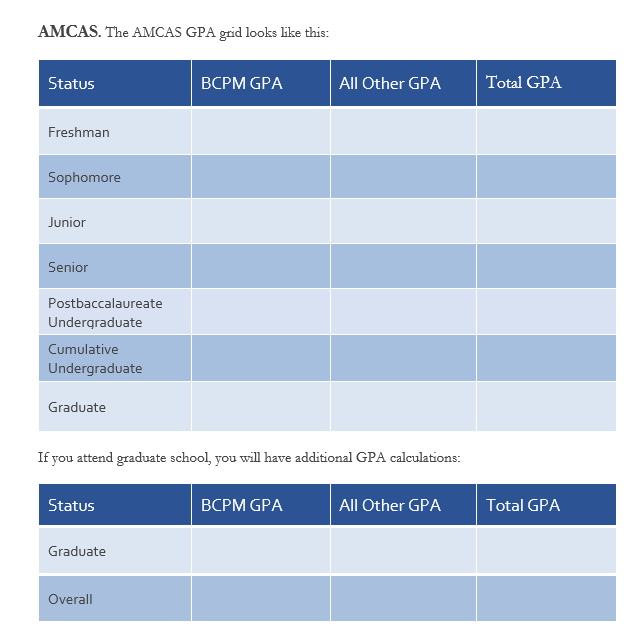 As you head towards senior year of college, you may find that you need additional academics post-graduation in order to be a competitive med school candidate. Many universities offer a post-baccalaureate program in the medical sciences that ranges from coursework for credit to a master’s degree. There are two types of programs that satisfy different goals for potential med school applicants:
As you head towards senior year of college, you may find that you need additional academics post-graduation in order to be a competitive med school candidate. Many universities offer a post-baccalaureate program in the medical sciences that ranges from coursework for credit to a master’s degree. There are two types of programs that satisfy different goals for potential med school applicants:
- Academic Enhancer Programs: For students who have completed the pre-med coursework, but whose undergraduate science GPA is not competitive enough for admission to medical school and who therefore need to demonstrate stronger mastery of science coursework through a Master’s program.
- Career-Changer Programs: For students who decide late in their college career to pursue medicine and need to complete required pre-med coursework.
In addition to offering an academic curriculum, post-bacc programs may provide guidance on preparing for the MCAT and engaging in medically related activities such as shadowing, community service, and research at the university affiliated with the program. Attending a post-bacc program and applying to med school after college also allows for your senior year grades to be taken into consideration in the med school review process.
Post-bacc programs also offer a chance to request a committee letter of recommendation to submit as part of your medical school applications. Some medical schools strongly prefer that candidates submit such a letter, also known as a committee packet, either from their college or post-bacc program, that contextualizes the candidate and summarizes their strengths and letters of evaluation. Such a packet from a post-bacc program will typically present the applicant in a more competitive way since it underscores the applicant’s motivation to perform better academically and participation in additional medically relevant experiences.
Often post-bacc programs have “linkage” arrangements with so-called “consort” med schools, which give students strong consideration and, possibly, conditional acceptance during their post-bacc year. This may eliminate the need for an additional “glide year” (also known as a gap year) between the post-bacc program and matriculation at med school. Candidates are reviewed in the spring of the program based on academic performance to date and MCAT scores.
Academic Enhancer Programs
Academic Enhancer programs, the more common post-bacc option, are ideal for students who have completed the pre-med requirements but whose academic performance in college does not place them in a competitive position for acceptance to medical school. Typically, these students have weak science and overall GPAs due to any of a number of factors, like a difficult adjustment to college, not realizing the importance of high grades on med school admissions, or trouble prioritizing schoolwork over social or extracurricular activities.
Academic Enhancer programs vary from one to two years in length, depending on the particular academic program, the depth of coursework, and whether research is included. Application deadlines vary; most programs have rolling admission and it’s advantageous to apply as early as is possible to put together compelling materials. Programs can take a number of forms; common options include Master of Science in Medical Sciences (MAMS), such as at Boston University; MS in Biomedical Sciences (MBS), such as at Duke University, Mount Sinai, and Vanderbilt University; and MS in Medical Physiology (MSMP), such as at Case Western Reserve University. Other more specialized programs include MS in Anatomical and Translational Sciences (M-ATS), such as at George Washington University.
Boston University’s MAMS program, to give one example, can be completed in either one or two years for the same cost, and requires students to complete a research or literature-based thesis (hence, many students choose to do the program over two years). The program offers access to a vast network of research opportunities across Boston, as well as a multitude of social-justice-oriented activities, such as harm reduction workshops. BU’s MAMS program also offers a very strong linkage with Boston University School of Medicine, which interviews post-bacc students in a separate applicant pool.
A subset of Academic Enhancer programs, Underrepresented in Medicine post-baccalaureate programs, are designed to support underrepresented students and increase the numbers who attend med school. The year-long Drexel Pathway to Medical School program, for example, “accepts individuals who are socioeconomically disadvantaged and/or belong to groups underrepresented in the medical profession.” Students who complete the program and achieve certain benchmarks are automatically accepted at the Drexel University College of Medicine.
Career-Changer Programs
While some students enter college knowing that they want to pursue a pre-med track with the goal of applying to medical school, other students do not decide to do so until junior or senior year, and therefore are unlikely to have taken the pre-med requirements. For these students, as well as for students who have been out of college for some time, an excellent option is to attend a post-bacc program that provides all the pre-med coursework in a condensed curriculum.
As with Academic Enhancer programs, the length of Career-Changer programs varies from one to two years, depending on how compressed a program suits students’ needs, and whether they wish to take more than the eight required pre-med courses of bio, general chemistry, organic chemistry, and physics (two semesters each). Boston University’s Post-baccalaureate Certificate in Medical Studies, for example, can be completed in one or two years—and in either the daytime or the evening—depending on students’ schedule and desires.
Post-bacc programs at universities with their own med schools sometimes have linkage programs with other med schools in addition to their own. Tufts University’s Postbaccalaureate Premedical Program, for example, has three additional linkages, at Boston University School of Medicine, University of Massachusetts Medical School, the University of New England College of Osteopathic Medicine.
Bryn Mawr College, in contrast, does not have its own medical school, but its year-long Post-baccalaureate Premedical Program—one of the oldest and most well-established—has linkages with 19 consort schools: “more than any other postbac program,” per their website. These include some of the top med schools in the country, such as Weill Cornell Medical College and University of Pittsburgh School of Medicine.
Impact of Grades Received in Post-bacc Programs on Med School Candidacy
Med schools look at the science GPA, non-science GPA, and overall GPA of coursework at the undergraduate and, if applicable, graduate level. Courses in both Career-Changer and Academic Enhancer Programs are all science courses and would count towards both the science and overall GPAs. Here are the differences:
- Courses in Academic Enhancer Programs that culminate in a Master’s degree would factor into the graduate-level science GPA, and would clearly demonstrate the applicant’s ability to handle the academic challenges of medical school work.
- Courses in Career-Changer programs are at the undergraduate level; strong grades could help offset weak grades in college courses and boost the overall undergraduate GPA.
By the Numbers
Post-bacc programs either use the centralized PostbacCAS application platform administered by Liaison or use their own applications. According to Robert Ruiz, Managing Director of PostbacCAS and Vice President for Strategic Enrollment at Liaison International, about 60% of post-bacc programs use the Liaison app. This affords us the benefit of providing aggregated data on programs and applicants. Caleb Marsh, Admissions Director of the Post-Baccalaureate Pre-Health Program at Temple University, and Co-Chair of the National Post-Bacc Committee of NAAHP, noted that the programs that do not use PostbacCAS are most likely smaller programs.
A total of 5833 applicants submitted applications to both Academic Record Enhancer and Career Changer program, a growth of 23.5%. In addition, the number of applications grew even more, by 29%, to 11,271, for an average of 1.81 applications per applicant. See the chart below for a breakdown by type of program.
For the Academic Enhancer applicants who applied to post-bacc programs that used the PostbacCAS app platform, the top three undergraduate majors included biology/biological sciences, neuroscience/neurobiology, and psychology. Here are their GPAs:
For the Career Changer applicants who applied to post-bacc programs that used the PostbacCAS app platform, the top three undergraduate majors included psychology, biology/biological sciences, and nursing. Here are their GPAs:
Planning for medical school is a complex process. If you would like guidance on any aspect of the med school application and admissions process, contact us at www.collegiategateway.com. As always, we’re happy to help!
Check out our events page for future medical school admissions presentations.



